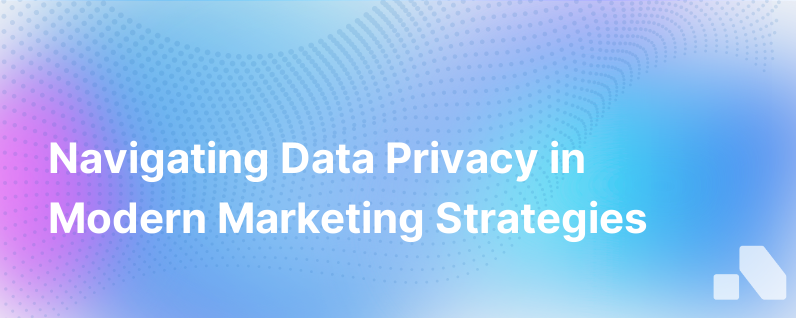
In the ever-evolving digital landscape, data privacy has become a critical concern that no business can afford to overlook. Today's consumers are more connected than ever before, seamlessly integrating technology into their everyday lives. This increased connectivity has ushered in an era of unprecedented data flow, where personal information is regularly exchanged for convenience, personalization, and efficiency.
Given this milieu, the intersection of data privacy and marketing is a hotbed of discussion, ripe with both challenge and opportunity. Brands that can navigate this complex terrain stand to build deeper trust and more enduring relationships with their customers, leveraging data responsibly to sharpen their marketing strategies without compromising consumer privacy.
This detailed guide explores the nuances of data privacy in marketing, shedding light on how businesses can ethically and effectively harness the wealth of consumer data at their fingertips.
The Rising Relevance of Data Privacy in Marketing
Increased public awareness and concern about privacy has forced marketers to reevaluate how they gather, use, and store consumer data. Data breaches, misuse of information, and ambiguous privacy policies have sharpened regulatory scrutiny, leading to the implementation of robust frameworks like the General Data Protection Regulation (GDPR) in Europe and the California Consumer Privacy Act (CCPA) in the United States.
These regulations have far-reaching implications, empowering consumers with agency over their data and holding companies accountable for compliance. As these privacy standards evolve and expand globally, marketers must ensure that their practices align not only with legal mandates but also with ethical considerations.
Marketing in a Privacy-Conscious World
Marketers have long depended on data to inform strategy, drive personalization, and optimize campaigns. This reliance entwines marketing success with the ability to adeptly manage consumer data. So, how can marketers pivot in this privacy-conscious world to maintain efficacy while safeguarding data?
Adopt Transparency
Transparency is the bedrock of building trust. Clearly communicating how you collect, use, and protect consumer data reassures customers about their privacy. Include straightforward language in your privacy policies, and ensure these documents are easily accessible. Equip your audience with the knowledge and tools to manage their preferences and consent.
Emphasize Consent
Enable consumers to opt into data collection and marketing communications. This consent-based approach not only aligns with privacy laws but also respects consumer choice, fostering a more engaged and receptive audience.
Lean on First-Party Data
First-party data, directly collected from consumers, is a gold mine for marketers and is less fraught with privacy concerns than third-party data. This information is gathered through interactions such as website visits, social media engagement, and subscriptions. It not only complies with strict privacy laws but also tends to be more accurate and relevant.
Prioritize Data Security
Implement robust cybersecurity measures to protect the data you collect. This includes encryption, regular security audits, and data minimization strategies—keeping only the data you need for as long as you need it. In the event of a breach, have a response plan ready to mitigate damage and promptly inform affected individuals.
Embrace Privacy by Design
Develop new products, services, and marketing initiatives with privacy at the forefront. This proactive approach embeds privacy into the fabric of your operations, ensuring compliance and security from the get-go.
Understand the Data Lifecycle
Efficient data management necessitates understanding the lifecycle of the data you collect—from acquisition through to deletion. Establish clear guidelines and practices for each stage, ensuring that data remains protected throughout.
Train Your Team
Ensure your marketing team is well-versed in data privacy principles and the nuances of regulations that pertain to your audience. Regular training and updates will keep them abreast of evolving standards and best practices.
Lean on Technology
Data privacy management can be complex, but technology solutions such as customer data platforms (CDPs) and consent management platforms (CMPs) can streamline the process. These tools aid in organizing, analyzing, and protecting data while easing the consent and preference management for users.
Monitor and Adapt
The realm of data privacy is dynamic, with new developments continually surfacing. Stay informed about changes in laws and consumer sentiment to adapt your strategies accordingly. This will necessitate ongoing reassessment of your practices to remain compliant and maintain consumer trust.
Champion Privacy as a Value Proposition
Rather than viewing privacy as a hurdle, position it as a key differentiator. By championing privacy, you not only comply with legal mandates but also appeal to the growing cohort of privacy-conscious consumers.
Mitigating Risks and Seizing Opportunities
Effective data privacy practices can mitigate the risks of non-compliance, reputational harm, and consumer distrust. By endorsing privacy, marketers can distinguish their brand, engender loyalty, and tap into the market segment for whom this is a deciding factor.
Advocating for privacy also presents an opportunity to review data collection strategies, eliminate redundancies, and zero in on the data that truly drives marketing success—culminating in more streamlined and purposeful marketing endeavors.
Conclusion
The confluence of data privacy and marketing represents one of the modern business landscape's most pressing challenges. Yet, with challenge comes opportunity. Marketers nimble enough to navigate this shifting terrain will not only bolster their compliance but will also cement the trust and loyalty of their customer base.
In this context, data privacy becomes an unexpected ally to marketers, prompting ingenuity and fostering deeper connections with consumers. As businesses weave privacy into their marketing strategies, they reinforce their commitment to ethical practice—a commitment that resonates with consumers and pays dividends in brand equity and customer engagement.